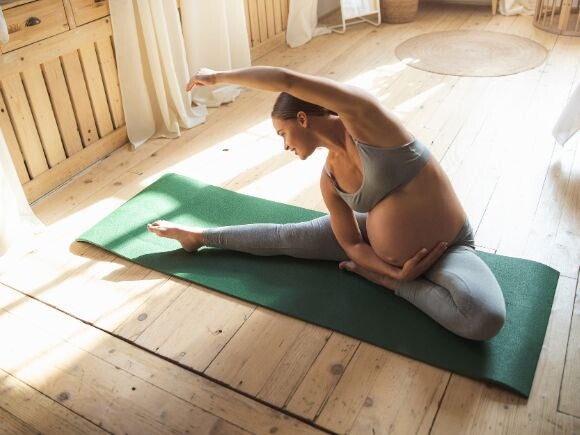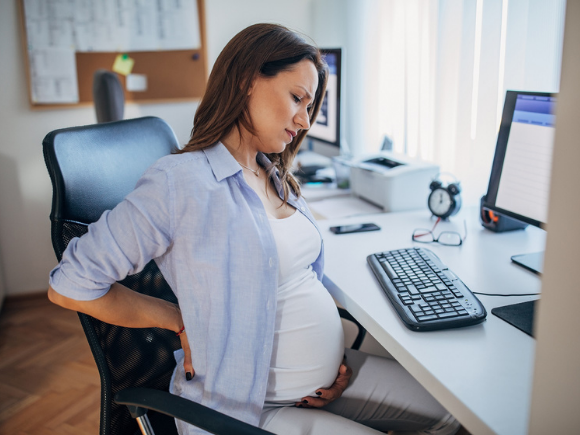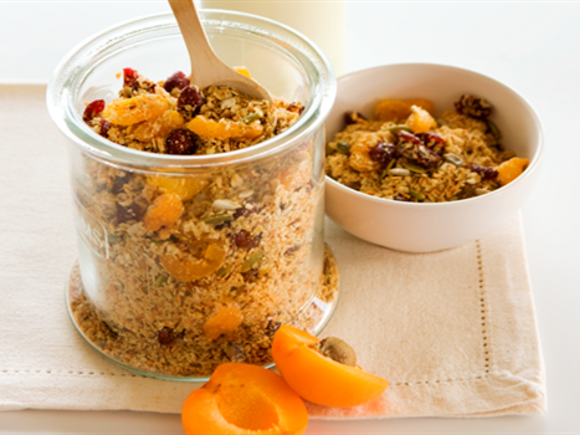Is it safe to exercise during pregnancy?
Yes, it is generally recommended to exercise and stay physically fit during pregnancy, but there are a few simple considerations when looking for pregnancy safe exercises:
- Consult with a healthcare professional before starting or continuing an exercise routine.
- Choose low-impact activities that are gentle on the joints and avoid activities with a high risk of falling or abdominal injury.
- Listen to your body, stay hydrated, and modify exercises as needed to accommodate the changes in your body
Why is physical activity during pregnancy good for you?
Exercising during pregnancy offers numerous benefits for both the mother and the baby. Regular physical activity can help:
- improve overall fitness,
- manage weight gain,
- boost mood,
- reduce pregnancy discomfort, and
- promote better sleep.
Here are specific considerations for exercise during each trimester:
First Trimester:
Exercise in the first trimester should focus on maintaining current fitness during pregnancy rather than pushing for intense workouts. If you and your baby are healthy, it is recommended you meet the physical activity guidelines set by the government, for all adult women.
- Be cautious of overheating and stay hydrated.
- Avoid pregnancy fitness exercises that involve lying flat on the back for an extended period.
Second Trimester:
It is common for energy levels to drop a bit during the second trimester, there’s a lot of growth and hormone changes happening. Engage in low-impact activities like walking, swimming, or prenatal yoga.
- Modify pregnancy exercises to accommodate a growing belly and maintain balance.
- Pay attention to joint stability and avoid activities with a high risk of falling or abdominal injury.
Third Trimester:
As your little lodger grows more and more, comfort and safety become priorities. Choose maternity exercises that are gentle on the joints and provide support, such as prenatal pilates or water aerobics.
- Listen to your body and avoid overexertion or exercises that cause discomfort.
- Focus on maintaining good posture and pelvic floor strength.
Recommended frequency of exercise:
According to government guidance, you should aim for some physical activity most days of the week. How much will depend on your starting activity levels:
- Were you ‘Very Active’ before pregnancy? Aim for:
- 15 to 30 minutes of high intensity aerobic activity, or
- 30 to 60 minutes of low to moderate aerobic exercise
2. Were you ‘Active’ before pregnancy? Aim for:
15 to 30 minutes of low to moderate aerobic exercise
3. Were you ‘Not Active’ before pregnancy? Aim for:
Start small and gradually build some physical fitness. Speak to a healthcare professional before starting an exercise routine during pregnancy to ensure it is safe and appropriate for your individual circumstances.
Regardless of your starting point, you can also incorporate strength training exercises to maintain muscle tone and support the body's changing needs. Listen to your body and adjust the frequency and intensity of exercise as needed
Safe maternity exercise
Exercise and maintaining fitness during pregnancy is a good thing for most women, it’s about finding what is the right exercise for you, in order to stay safe. Choose pregnancy exercises that are safe for you at each stage of your pregnancy, so that you stay active and maintain a healthy lifestyle throughout your journey.
Pregnancy-safe exercises:
AEROBIC | STRENGTH | PELVIC FLOOR |
| Low-impact activities such which help maintain cardiovascular fitness without placing excessive stress on joints. | Gentle options can help maintain muscle tone and support your changing body. | Exercises that strengthen your pelvic floor muscles are highly beneficial for preparing, and recovering from childbirth |
| Brisk walk | Prenatal pilates | Kegels |
| Swimming | Yoga | Pregnancy pilates |
| Cycling | Resistance band workouts | Yoga |
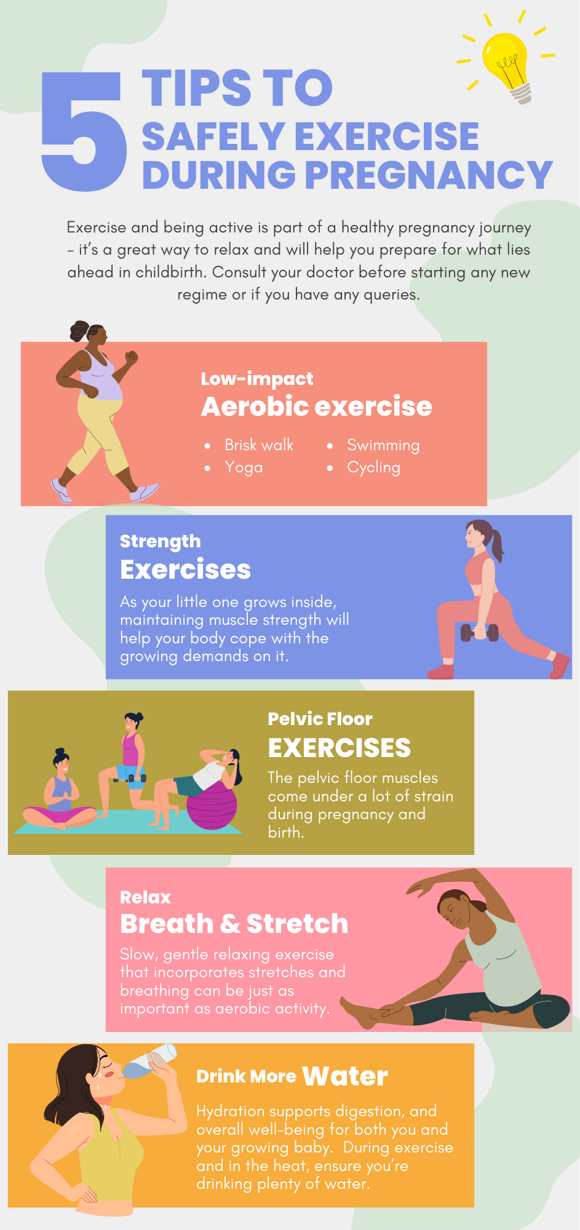
Exercises to avoid when pregnant
During pregnancy, it is important to avoid certain exercises to ensure the safety and well-being of both mum and baby.
- High-impact activities that involve jumping, bouncing, or sudden changes in direction should be avoided as they can strain the joints and increase the risk of falls.
- Exercises that involve lying flat on your back for an extended period should be avoided, especially in the second and third trimesters, as they can compress major blood vessels.
- As your pregnancy progresses, it is advisable to modify exercises that put excessive pressure on your abdomen, such as heavy weightlifting or intense abdominal exercises.
- Avoid any activity that causes pain or discomfort.
Always consult with a healthcare professional or a qualified prenatal fitness instructor for personalised guidance on pregnancy safe exercises during each trimester of pregnancy.
Tips for exercising during pregnancy
Follow these practical tips to stay fit and active during your pregnancy.
- Exercise and being active is part of a healthy pregnancy journey – it’s a great way to relax and will help you prepare for what lies ahead in childbirth. Find a pregnancy safe exercise you enjoy and build it into your schedule, but always consult your doctor before starting any new regime or if you have any queries.
- Warm up before exercise. This helps increase blood flow to the muscles, prepares the body for physical activity, and reduces the risk of injury. It also helps to gradually elevate the heart rate and loosen the joints, ensuring a safe and effective workout for both you and your baby.
- Stay hydrated. Keeping well hydrated is always important, but when you’re exercising it’s even more important as you naturally lose more water from your body as your temperature rises. Staying hydrated helps regulate body temperature, prevents dehydration, aids in digestion and supports your baby’s insulation too.
- Stay within weight gain guidelines. The heavier you are, the more tired you’ll feel. This is a little unavoidable as your pregnancy progresses, so it’s important to minimise excess weight gain which will make this worse on you.
- Comfort is key. Choose comfortable clothing to exercise in, this will help you stay flexible as it’s less restrictive on movements, something you’ll appreciate as your belly expands. Also choose comfy shoes and a supportive bra.
- Manage your activity expectations
- Don’t strain yourself. It’s perfectly safe to exercise provided you don’t push yourself too hard. For example, whether on the job or doing household chores, take a seat when you need to, don’t overdo it.
- Be mindful that your body is changing. As your pregnancy progresses your balance may be affected due to the shift in weight distribution, and this can make you more unsteady and unable to do activities you previously could.
- Prioritise activities to cut out non-essential chores;
- Reassess your socialising and ask family and friends not to call late in the evening. Explain that you’re trying to get plenty of rest before your baby arrives;
- Try to do restful activities just before bed to encourage a good sleep. Try a bath, a massage, reading or a walk in the garden or around the block. Avoid falling asleep in front of the TV or spending a lot of time online.
Stretching during pregnancy as part of your warmup and cool down can help keep your ligaments and joints flexible and avoid tight muscles which can be restrictive on your movements.
Regular stretching can alleviate common pregnancy-related issues and pains linked to muscle tightness. It also promotes better circulation and relaxation. Remember to perform gentle stretches, avoid overstretching, and listen to your body's cues.
Talk to a trained exercise healthcare professional for specific stretching recommendations during pregnancy and remember that as your baby and body grows be mindful to adjust or stop certain stretches to avoid strain and discomfort.
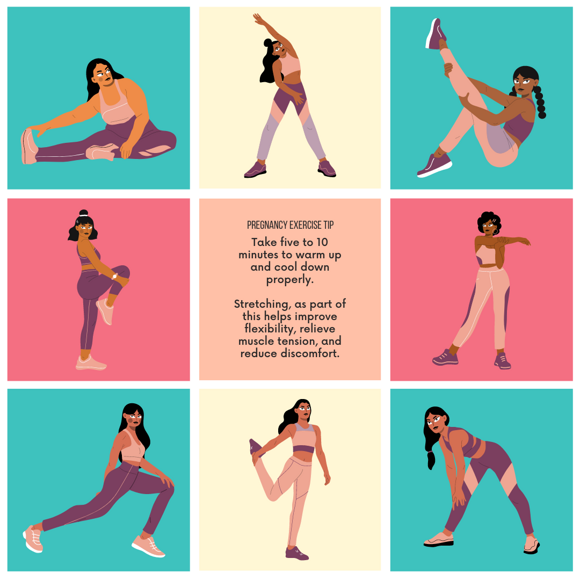
When to stop exercising
It is important to listen to your body when exercising during pregnancy. If you experience any warning signs such as:
• vaginal bleeding,
• severe headaches,
• dizziness,
• chest pain, or
• shortness of breath,
STOP exercising immediately and consult your healthcare professional.
Feeling unwell after exercise, such as persistent nausea, extreme fatigue, or muscle weakness, should also prompt a conversation with your doctor. Prioritise your well-being and seek medical advice if you have any concerns about your health during pregnancy.
FAQs
Can you run when pregnant?
The general rule is that if you were running before you were pregnant it is usually safe to continue once you fall pregnant. As your pregnancy progresses you should monitor the safety of continued running, on your joints, balance, and your baby. If you plan on starting to run once you are pregnant it’s important to speak to your healthcare professional before commencing.
What exercises to avoid when pregnant.
To ensure safety during pregnancy, it is advised to avoid exercising in hot and humid weather, as well as prolonged periods of standing or lying down. Additionally, it is recommended to steer clear of physical activity that causes pain or discomfort, requires heavy lifting, and exercise at high altitudes exceeding 2,000 metres. Always prioritise your well-being and consult with your healthcare professional for personalised exercise guidelines.
Can I walk in early pregnancy?
Of course! For most pregnant women, walking is one of the safest exercises you can do while pregnant. A brisk walk will get your heart rate up without putting too much strain on joints and muscles and is often an exercise you can pick up safely and easily while pregnant.
Can you lift weights when pregnant?
Yes, lifting weights can be safe during pregnancy with proper precautions. If you’ve never lifted weights before you should definitely talk to a trained fitness health professional to get a tailored program for your pregnancy, before you start. If you are an old hat at lifting weights prior to your pregnancy it is important to use lighter weights, focus on proper form and posture, avoid heavy lifting that strains the abdomen, and listen to your body. A good alternative to lifting weights while pregnant is strengthening activities such as light resistance bands or bodyweight exercises. Consult with your healthcare professional for personalised guidance based on your pregnancy circumstances.
Is it safe to do abdominal exercises during pregnancy?
While it is generally considered safe to do abdominal exercises during pregnancy, it is important to modify them as your pregnancy progresses. Avoid exercises that involve lying flat on your back and focus on gentle core-strengthening exercises that don't strain the abdomen. Pilates and yoga specially designed for pregnancy can be a great way to safely work your core muscles. Consult with your healthcare professional for a personalised exercise program that adapts to your pregnancy.
Sources:
- Australian Government guidance on physical activity and exercise for pregnancy, accessed at: https://www.health.gov.au/topics/physical-activity-and-exercise/physical-activity-and-exercise-guidelines-for-all-australians/for-adults-18-to-64-years
- Pregnancy Birth and Baby website, accessed at: https://www.pregnancybirthbaby.org.au/exercising-during-pregnancy
